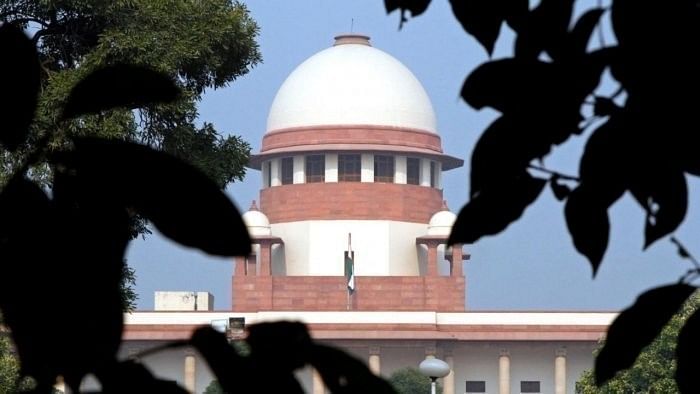
The Supreme Court of India.
Credit: PTI File Photo
New Delhi: The Supreme Court on Monday held that an accused, already in custody in a criminal case, can still seek anticipatory bail in another case, saying each arrest a person faces compounds their humiliation and ignominy.
A bench of Chief Justice of India D Y Chandrachud and Justices J B Pardiwala and Manoj Misra said there is no express or implied restriction in the CrPC or in any other statute that prohibits the Court of Session or the High Court from entertaining and deciding an anticipatory bail application in relation to an offence, while the applicant is in custody in relation to a different offence.
The court upheld the maintainability of pre arrest bail of Amar S Mulchandani in a separate cheating case, though he was already arrested in an ED case.
Senior advocate Sidharth Luthra, appearing for complainant Dhanraj Aswani, said the pre-condition to invoke Section 438 CrPC is that the accused should have a reason to believe that he “may be arrested”. If the accused is already in custody, then he can have no reason to believe that he “may be arrested”, he said.
Senior advocate Siddharth Dave for the respondent accused said the arrest of an accused in one case cannot foreclose his right to apply for pre-arrest bail in a different case.
Agreeing to the submission, the bench said, "No restriction can be read into Section 438 of the CrPC to preclude an accused from applying for anticipatory bail in relation to an offence while he is in custody in a different offence, as that would be against the purport of the provision and the intent of the legislature".
The court said the right of an accused to protect his personal liberty within the contours of Article 21 of the Constitution with the aid of the provision of anticipatory bail as enshrined under Section 438 of the CrPC cannot be defeated or thwarted without a valid procedure established by law
The court said the procedure should also pass the test of fairness, reasonableness and manifest non-arbitrariness on the anvil of Article 14 of the Constitution.
"Under Section 438 of the CrPC, the pre-condition for a person to apply for pre-arrest bail is a “reason to believe that he may be arrested on an accusation of having committed a non-bailable offence”. Therefore, the only pre-condition for exercising the said right is the apprehension of the accused that he is likely to be arrested," the bench said.
The custody in one case does not have the effect of taking away the apprehension of arrest in a different case, the bench said.
"Each arrest a person faces compounds their humiliation and ignominy. We say so because each subsequent arrest underscores a continued or escalating involvement in legal troubles that can erode the dignity of the person and their public standing," the bench said.
"The initial arrest itself often brings a wave of social stigma and personal distress, as the individual struggles with the implications of their legal predicament. When a subsequent arrest occurs, it intensifies this emotional and social burden, amplifying the perception of their criminality and reinforcing negative judgments from society," the bench added.
The court felt each additional arrest exacerbated the person’s shame making the cumulative impact of such legal entanglements increasingly devastating.
